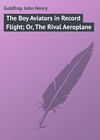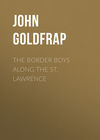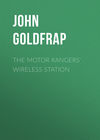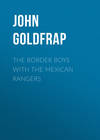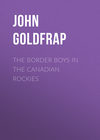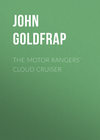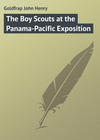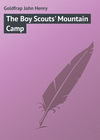Read the book: «The Boy Aviators in Record Flight; Or, The Rival Aeroplane», page 5
CHAPTER XI.
THE FIRST LEG
The country now began to be more thickly settled. In fact, the boys passed a constant series of surprised villages and frightened farms. While they were passing above one hillside farm, in fact, they were received with a demonstration of more than surprise. A man in blue jeans came running out into his barnyard with a shot-gun, and fired the contents of both barrels upward at the young navigators. At the height they were flying, however, a shot-gun could not harm them.
A short time later Harry lay down for a nap, after both boys had eaten some of the cold lunch they had packed at Remson. He slept under protest, but Frank insisted that after their harrying night trip they both needed sleep. He agreed to take his turn later. In the meantime, in the auto, Billy Barnes and Witherbee dozed off and shared watches with Lathrop and old Mr. Joyce. Neither the miner nor the inventor could drive an auto, so it was necessary to divide up the hours of sleep in this way.
While the lads are taking a rest, it may be as well to turn back to the lone farm at which the Despatch party had decided to stop for breakfast. So engrossed had they been over the meal, and so busy had the farm folks been serving them, that none of the party had noticed the boys’ aeroplane fly over, and they made very merry at the thought that they were miles ahead of them. Fred Reade was sure they had broken down, and his confidence that they had met with an accident was shared by Luther Barr, Slade and the red-bearded man, whose name was Ethan Aram, and who was Slade’s substitute driver.
“I feel like lying down for a nap,” said Luther Barr, after breakfast, but his desire was overruled by the others. It was pointed out that he could take a nap in his auto just as well.
“We want to beat those cubs good while we are at it,” said Reade, and this stroke of diplomacy won over old Barr. Taking turns at snoozing, therefore, the party pressed on at a leisurely rate, little dreaming that the Boy Aviators were far ahead and nearing Pittsburg. There was another reason for their decreased speed, also. They wished to take advantage of what they considered a great stroke of good luck to let their engine cool off thoroughly.
As the aeroplane flashed above Lockhaven, Pa., the wires began to get red-hot with news of their close approach to Pittsburg. In the Smoky City huge crowds gathered and awaited patiently for hours the coming of the air racers. Every park and open space held its quota of excited people, and flags were run up on every building.
Frank and Harry had both had a sleep before. Pointing to the southwest of their course Harry indicated a heavy dark pall that hung against the sky.
“That must be the Smoky City,” he exclaimed, and, sure enough it was. Soon the junction of the Alleghany, Monongahela and Ohio rivers in their Y-shaped formation became visible. Then the dark factory buildings, belching out their clouds of black smoke to make perpetual the city’s inky pall. Then the occasional gushes of flame from foundry chimneys, and the long processions of funereal ore and coal barges on the gloomy rivers.
The boys landed in Schenley Park, a fine expanse of wooded and lawned landscape, one of the few beauty spots in the city of gloom. Here it seemed as if at least a quarter of Pittsburg’s population was out to greet them. The police had formed hasty lines as soon as it became evident that the boys meant to land on an open stretch of grass, but they had a hard struggle to keep back the crowds. They were speedily re-enforced by reserves from all parts of the city, however, and soon had the crowd in order.
It had been arranged by telegraph that in case of the contestants landing in a public park that the city would allow them to keep the machine there as long as they wanted, so that after the boys had arranged for a guard to be kept over the Golden Eagle and the shelter tent carried in the auto – which came chug-chugging up half an hour after the boys had landed – had been rigged, there was nothing to do but to go to the hotel for a wash-up and what Billy Barnes called “a real feed.”
Of course the first question the boys had asked when they landed was:
“Anything been seen of the other racers?”
They were delighted to learn that there had not, although they were pretty sure, anyhow, that they were the first to arrive. At the hotel, as the party entered it, having distanced the crowd by speeding through side streets, the manager bustled up and asked for Mr. William Barnes. Billy replied that he was the person sought.
“Then, there’s been a wire here for you more than a day,” said the manager. “It has been chasing you around every hotel in the city, I guess.”
He produced a yellow envelope. Billy opened it eagerly, and then gave a wide grin.
“Whoop-ee, look here,” he cried, extending the message to the boys to read.
“Will you accept position special correspondent with aeroplanes for Planet? Owe you an apology for unfortunate mistake. Reade’s treachery discovered.
“Stowe,“Managing Editor Planet.”
Of course Billy Barnes accepted the commission, although for a time he had a struggle with his pride to do so. However, as Frank demonstrated to him, Mr. Stowe had acknowledged his mistake, and he would only have presented himself in the light of a stubborn, obstinate youth if he had refused to accept his offer.
The young reporter was in the Western Union office that night filing a long account of the incidents of the trip, not forgetting the accident to the dirigible and its subsequent safe arrival at Pittsburg – though several hours late – when Fred Reade entered. The Slade aeroplane had descended in Highland Park about three hours after the arrival of the boys, and the chagrin of the Despatch people and of Luther Barr and his crowd may be imagined when they learned that they had been badly beaten on the first leg of the trip.
There was a scowl on Reade’s face as he sat down and began to write. His anger deepened as he saw that Billy Barnes paid not the slightest attention to him. Finally he said sneeringly:
“What are you writing for now, anyhow? I thought you were out of a job.”
“So I was till a short time ago,” flashed back Billy, “when the Planet seems to have found out something about a young man named Reade.”
“What do you mean?” asked Reade in a voice he tried to render blustering, but which shook in spite of himself.
“I’m not going into details; you know well enough,” said Billy in a quiet, meaning tone, looking Reade straight in the eye.
The other pretended to get very busy with his writing, but as Billy was leaving the office, he looked up and exclaimed:
“You and your friends think you are mighty smart, but we’ll trim you yet, you see if we don’t.”
“Well, you’ll have to wake up, then,” laughed Billy, “you didn’t do much trimming to-day.”
Franke Reade cast a furious glance after the young reporter as he left the telegraph office.
“I’ll make you pay for that when we get out in the wild country,” he said furiously.
At the hotel Billy found the boys in conversation with McArthur. He had made arrangements to have his ship reinflated that night, he told them, and in future meant to carry with him several cylinders of hydrogen gas. He had telegraphed ahead to Nashville and several other towns on the route to San Francisco to have supplies ready for him, and anticipated no further trouble on that score. He had also been lucky enough to get a propeller from a man who had been making dirigible ascensions at a Pittsburg park, but who had been injured a few days before in an accident.
The boys and their party turned in early and slept like tops. They were up betimes, and after a hasty breakfast motored out to the park. They found the aeroplane in perfect trim, and after replenishing the gasolene and water tanks and thoroughly oiling every part of the engine, they were once more ready to start. A big crowd had gathered, early as was the hour, and gave them a mighty cheer as they swept into the air. The next minute the auto was off, and it was a light-hearted party that occupied its tonneau.
CHAPTER XII.
ATTACKED BY COWBOYS
The Smoky City, with its inky smoke canopy, bluff-bordered rivers and distant heights crowned with beautiful residences, was soon left far behind. But for a long time the boys flew high above veritable gridirons of railroad yards crowded with busy freight trains and puffing yard locomotives. Every one of the engines gave them a screeching greeting as they soared steadily along far above them.
But they were not alone in the air. The Slade machine was close behind them, with his assistant at the wheel. McArthur’s dirigible, too, was off a few minutes after the boys took the air. The three racers flew onward with no perceptible difference in the distances between them. Each seemed to be grimly holding its own. At Steubenville, Ohio, the boys struck the Ohio river and flew above its course as far as Ashland, where they crossed the border line of the state into Kentucky.
In forty-eight hours more, having allowed ample time for rests and engine adjustments, they arrived at Nashville, Tenn., having passed the border line of the state a few hours before. For several hours they had not seen the other racers, but at Nashville they learned that Slade’s aeroplane had arrived four hours ahead of them, having therefore gained one hour in actual time.
The gain had probably occurred while the boys were delayed at a small town near the Kentucky border fitting new spark plugs, those they used having become badly carbonized by their hard service. They spent little time in the beautiful capital of Tennessee on the banks of the historic Cumberland river. The crowds pestered them to such an extent that they were anxious to hurry on as soon as possible. An examination of the engine, however, showed that it was in need of considerable adjustment, and old Mr. Joyce was compelled to spend several hours over it. The gyroscopic balancer likewise was in need of having its bearings attended to. Slade seemed to have better luck, for his party left Nashville two hours ahead of the Boy Aviators. The start of the Despatch craft was closely followed by that of McArthur’s dirigible, carrying a large gas supply. The extra weight had been compensated for by ripping out a large part of the cabin and cutting down every ounce carried, so far as it was possible to do so without imperiling the ship.
However, when they finally did take the air from the meadow on the banks of the Cumberland in which they had camped, the boys had the satisfaction of knowing that their craft had had a thorough overhauling. The auto, also, had had new tires fitted and its engine overhauled.
The journey across the rolling plains of Arkansas, skirting the Ozarks to the south, on across the vast levels of Oklahoma, fertile with crops and dotted with thrifty homesteads and small frontier towns, was made without incident. One night the boys found themselves camped on the banks of the Canadian river, not very far from the town of Bravo, in the northwest of the great Panhandle of Texas. For two days, now, they had not seen either of their competitors, and had no idea of where either of them were, though at infrequent opportunities he had in the wild country through which they were now traveling, Billy had tried several times to ascertain by telegraph some word of their whereabouts.
The heat was, as Billy said, enough to fry the horn-toads that crawled about on the vast level that stretched, quivering in the torrid sun rays, as far as the eye could reach on every side of the boys’ camping-place. Fortunately they had selected a site beneath an old sycamore tree, which gave them some scanty shade. High against the blazing sky a few turkey-buzzards wheeled, doubtless watching the camps with speculative eyes to ascertain if they were all alive.
But on this latter point there could have existed no doubt in the minds of any human onlookers. The clink-clink of hammers and drills, as the boys worked over their engine with old Mr. Joyce superintending, while Billy Barnes and Lathrop were actively employed loading the auto with a camping kit, gave the camp an appearance of great life and bustle. As for Bart Witherbee, he was at his favorite occupation of cooking. He had shot some young jack-rabbits a few hours before, and was now composing a stew.
“I didn’t know jack-rabbits were good to eat,” exclaimed Billy, when the miner had brought them into camp.
“Young ones is,” explained the plainsman, “but keep away from the elderly jack-rabbits.”
Suddenly Billy, who had looked from his task for the fiftieth time to remark that it was hot, noticed quite a cloud of dust swirling toward the adventurers across the prairie.
“Gee, here comes a whirlwind!” he exclaimed, pointing. The others looked, too.
“Maybe it’s a cyclone,” suggested Harry.
Old Witherbee placed his hand over his eyebrows and peered long and earnestly at the rapidly approaching cloud of yellow dust.
“Whatever is it?” asked Frank.
“Somethin’ that I’m afeard is goin’ ter make it mighty uncomfortable for us,” exclaimed Witherbee, with a tone of anxiety in his voice.
“Mighty uncomfortable, how? Will it blow the auto away?” asked Billy.
“No, youngster, but it may blow us up; that cloud yonder is a bunch of skylarking cowboys, and they’re coming right for us.”
“Will they kill us?” asked Billy anxiously.
“No, I don’t think it’ll be as bad as that; though they git mighty onery sometimes. Don’t you boys give ’em no back talk, and maybe we’ll get out all right.”
The rapid advance of the approaching cowboys could now be heard. Their ponies’ hoofs could also be seen as they flashed in and out under the cloud of dust.
Suddenly there was a terrific volley of yells, and, as the cavalcade drew rein, the cloud rolled away and the boys found they were surrounded by forty or fifty wild-looking fellows, all yelling and shouting. Some of them had revolvers and were firing them in the air. The din was terrific.
“Throw up yer hands, yer Scanderhovian bunch of tenderfeet,” shouted the leader, a big man on a buckskin pony, whose legs were incased, despite the intense heat, in a huge, hairy pair of bearskin “chaps.”
The boys all elevated their hands, and old man Joyce and Bart Witherbee hastened to follow their example.
“Where’s this yar sky schooner yer goin’ a-sailin’ around in, scaring our cattle and driving the critters plumb crazy?” he demanded angrily.
“If you mean our aeroplane, there it is,” said Frank, indicating the machine.
“Wall, there was two of them went over here yisterday, and all the beef critters on the Bar X range is plum stampeded all over the per-arie. We’re goin’ ter stop this, an’ we might as well begin right now. Come on, boys, shoot the blame thing full o’ holes and put a few in ther choo-choo wagin while yer at it.”
The situation was critical indeed.
The boys saw no way of saving their aeroplane, and to add to their troubles they had been informed that their two rivals were in front of them.
Frank alone retained his presence of mind. He saw that only by a trick could they regain their safety from the desperate men into whose power they had fallen.
“Did you ever see an aeroplane before?” he asked of the leader.
“No, I never did,” replied the other; “why?”
“Well, you seem to have a pretty dry part of the country out here, and I guess a little rain would do it no harm.”
“That’s right, stranger, you never spoke a truer word; but what in thunder has that got to do with yer blamed scaryplane, or whatever you call it, scaring all our beef critters away?”
“I am very sorry for your misfortune, Mr. – Mr. – ”
“Rattlesnake Ike is my name, with no blame ‘Mister’ on it, young tenderfoot,” growled the other.
“Well, Rattlesnake Ike, we can make rain.”
“What?” roared the whole assemblage.
“We can make rain,” calmly repeated the boy, “with that aeroplane.”
“Wall, now, stranger, how kin yer do that – tell us,” demanded the leader of the cowboys, leaning forward on the bow of his saddle, deeply interested.
“Well, you’ve heard that explosions near the sky will concentrate the moisture, thus causing it to condense in a copious rainfall,” declaimed Frank pompously, putting in all the long words he could think of.
“Hump – wall,” dubiously remarked the cowboy, scratching his head, “I dunno as I hev, but you seem ter have it all down pat.”
“That’s what we’ve been doing with our aeroplane,” went on Frank, “making rain. Haven’t we?” he turned to Witherbee questioningly. The miner at once saw what he was driving at.
“Sure,” said the old miner. “Why, pardners, down in Arkansaw they had forgotten what rain looked like till we came along. We made it pour for three days.”
“And that scaryplane does it?”
“Well, we go up in it and then fire bombs from this rain-gun.”
Frank indicated the searchlight as he spoke.
“Wall, I’d sure like ter see that,” said the leader. “How about it, boys?”
“Let’s see what they kin do; but if yer don’t make it rain, strangers, we’ll string you all up ter that sycamore tree,” decided one of the group.
They all chorused assent, and Frank and Harry at once got into the machine.
“Hand me some rain bombs, Billy,” said Frank.
Billy Barnes reached into the tonneau and produced some blue flares. These he handed to Frank.
“Take care they don’t go off, Frank,” he said solemnly.
“Yes; you recollect them twenty fellers as was killed in St. Looey,” warned old Witherbee solemnly.
“Say, strangers, are them there things dangerous?” asked the cowboy leader.
“Well, there’s enough dynamite in them to blow that river there clean into the next county,” rejoined Frank, “but don’t be scared, we won’t drop them.”
“Get into the auto when we are well up,” Frank whispered rapidly to Billy, while the cowboys exchanged awed glances.
“Now, gentlemen,” he went on aloud, “get your umbrellas ready, for pretty soon there’s going to be some big rain.”
The aeroplane started up while the cowboys yelled and whooped. It had reached a height of about two hundred feet, and was circling above their heads, when Harry suddenly lighted one of the fizzing blue flares; at the same instant Billy, followed by the others, leaped into the auto.
“Hey, stop that!” yelled the cowboy leader, but at the same moment he broke off with a yell of terror.
“Look out for the dynamite bomb!” yelled Harry, as he dropped the flaming blue flare over the side of the aeroplane, fairly on top of the gang of cowboys.
“Ride for your lives, boys!” shouted the leader of the cowboys, as the flaming light dropped, “she’s goin’ ter bust.”
They didn’t need any urging, but fled with wild cries.
By the time the cattlemen realized they had been tricked, the auto was away on the prairie, speeding on toward the west in a cloud of dust, while the aeroplane was far out of range.
CHAPTER XIII.
INDIANS!
“Ah, now we are beginning to get into my own country again; this begins ter look like home,” exclaimed Bart Witherbee, one day as the adventurers made camp in a canyon in one of the southernmost spurs of the Rockies in the state of New Mexico. The boys had made the detour to the south to avoid crossing the range itself, which would have been a difficult, if not an impossible, task in an aeroplane.
Still they had not sighted the rival racing air-craft, but they knew that the others could not be far ahead now, as at a small settlement they stopped at the day before they learned that the Slade party had called at the blacksmith shop there to repair a truss brace that had snapped. As the facilities of the smithy were rather clumsy for the fine work that has to be done on the aeroplane, the Slade machine was delayed several hours. So far as their judgment went, the boys decided that the other party could not be much more than fifty miles ahead of them.
As for the dirigible, they had heard that the expansion of its gas bag, caused by the sun, had compelled it to remain all one day in a small town in the Texas Panhandle, and that while it was journeying across the arid country it could travel only short distances. The boys, therefore, felt much cheered as at sundown they alighted by the side of a brawling mountain stream and made camp. Bart Witherbee at once got out his improvised fishing tackle and started up the stream in search of trout, which he declared would abound in such waters.
“We’ll have a change from canned beef, canned soup and canned vegetables to-night, boys,” he declared, “if I haven’t lost the knack of it.”
They listened to his heavy footsteps plunging up the steep hillside till they died out, and then took up the ordinary occupations of the camp. The rocky defile up which the old miner had disappeared on his quest was well covered with pine timber almost down to where it reached the arid ground on the edge of which the lads were camped. Except for the occasional scream of a hawk making for its night roost, or the crash of some animal making its way through the dense growth that grew higher up on the hillside, the place was as quiet as a cemetery.
Billy Barnes was examining his camera, which had been severely shaken up on the trip, Frank and Harry were going over the Golden Eagle admiringly, remarking on the way she had stood her hard ordeal, and old Mr. Joyce was taking a lesson in wireless telegraphy from Lathrop. It was beginning to grow dusk. Somewhere far up on the hillside there came the hoot of an owl. The hush of the evening in the foothills lay over everything, when suddenly the silence was broken by a sound that brought them all to their feet.
The report of a rifle had rung out on the hillside above them.
“Must be Bart shooting at something,” remarked Billy, gazing at the scared faces about him.
“That was a rifle shot,” said Frank slowly, “and Bart Witherbee carried no rifle.”
“Then somebody else fired it?”
“That’s about it. Don’t make a sound now. Listen!”
They all held their breaths and waited anxiously in the stillness that followed. For perhaps ten minutes they stood so, and then there came a sharp crackle of snapping twigs, that told them some one was descending the hillside.
Who was it?
Several minutes of agonizing suspense followed before they knew whether it was friend or enemy advancing toward them. Then Bart Witherbee glided, like a snake, out of the woods.
“What’s the mat – ” began Frank. But he checked himself instantly.
Bart Witherbee’s hand was held up.
Every one of the group read that mute signal aright.
Silence!
The old plainsman waited till he got right up to the group before he spoke, and then it was in a hushed tense whisper.
“Injuns,” he said, “they’re up on the hillside.”
“How many?” whispered back Frank.
“I dunno exactly, after that there bullet I didn’t wait ter see, and say, boys, I had ter leave as nice a string of trout as you ever see up there fer them pesky redskins ter git at.”
“Never mind the fish, Bart,” urged Frank, “tell us, is there danger?”
“There’s allus danger when Injuns is aroun’, and think they kin git somethin’ that’s vallerble without gitting in trouble over it,” was the westerner’s reply.
“We’d better get away from here right away,” exclaimed Harry.
“Not on your life, son,” was Bart’s reply; “not if I know anything about Injuns an’ their ways. No, sons, my advice is ter git riddy fer ’em. They was startled when they see me, therefore they didn’t know we wus here till they stumbled on me. That bein’ the case, I reckin they don’t know about that thar flying thing of you boys.”
“And you think we can scare them with it?” began Frank eagerly.
“Not so fast, son, not so fast,” reprimanded the old man. “Now, them Injuns won’t attack afore dark, if they do at all. An’ when they do, they’ll come frum up the mountain-side. Now, my idee is to git that thar searchlight o’ yours rigged up, and hev it handy, so as when we hear a twig crack we kin switch it on and pick ’em out at our leisure.”
“That’s a fine idea, Bart, but what if they attack us from behind?” suggested Frank.
“They won’t do that. Yer see, behind us it’s all open country. Wall, Injuns like plenty of cover when they fight.”
“Perhaps we could connect up some blue flares, and plant them on rocks up the hillside, and scare them that way,” suggested Billy.
“That’s a good idee, son, but who’s goin’ ter go up there an’ light ’em? It would be certain death.”
“Nobody would have to go up and light them,” eagerly put in Harry. “We can wire them up and then just touch them off when we are ready. We can get plenty of spark by connecting up all our batteries.”
“Wall, now, that’s fine and dandy,” exclaimed the miner admiringly, “see what it is ter hev an eddercation. Wall, boys, if we’re goin’ ter do that, now’s the time. Them Injuns won’t attack afore dark, and if we want ter git ready we’d better do it now.”
While Frank and Harry planted the blue flares on rocks on the hillside within easy range of the camp, and old Mr. Joyce utilized his electrical skill in wiring them up and connecting them to a common switch, Billy and Lathrop and Bart Witherbee struck camp and packed the paraphernalia in the tonneau of the auto.
“Better be ready ter make a quick gitaway,” was the miner’s recommendation.
These tasks completed, there was nothing to do but to wait for a sign of the attack. This was nervous work. Bart had informed the boys that in his opinion the Indians were a band from a reservation not many miles from there who had somehow got hold of a lot of “firewater” and had “got bad.”
“I’ll bet yer there’s troops after ’em now, if we did but know it,” he opined.
“Well, I wish the troops would get here quick,” bemoaned Harry.
“They won’t git here in time ter be of much use ter us,” remarked old Bart, grimly biting off a big chew of tobacco, “and now, boys, keep quiet, and mind, don’t fire till I tell yer, and don’t switch on them lights till I give you the word.”
How long they waited neither Frank nor Harry nor any of the others could ever tell, but it seemed to be years before there came a sudden owl hoot far up on the hillside.
“Here they come, that’s their signal,” whispered old Bart in Frank’s ear; “steady now.”
“I’m all right,” replied Frank, as calmly as he could, though his heart beat wildly.
The hoot was answered by another one, and then all was silence.
Suddenly there came the crack of a twig somewhere above. It was only a mite of a noise, but in the stillness it sounded as startling as a pistol shot.
“We won’t have to wait long now,” commented Bart in a tense undertone; “all ready, now.”
Each of the boys gripped his rifle determinedly. Old Mr. Joyce had been armed with a pistol. At their elbows lay their magazine revolvers fully loaded.
Following the first snapping of the twig there was a long interval of silence. Then the staccato rattle of a small dislodged rock bounding down the hillside set all hearts to beating once more.
The attack was evidently not to be delayed many moments now.
It came with the suddenness of the bursting of a tropical storm.
Hardly had the boys drawn their breath following the breathless suspense that ensued on the falling of the rock before there was a wild yell, and half a dozen dark forms burst out of the trees. They were received with a fusillade, but none of them were hurt, as they all vanished almost as quickly as they had appeared.
“That was just to see if we was on the lookout,” said old Bart in a whisper. “I reckon they found we was. Look out for the next attack.”
They hadn’t long to wait. There was a rattle of falling stones as the main body rushed down the hillside.
“Now!”
Old Bart fairly screamed the command in his excitement.
At the same instant Billy shoved over the switch that connected the sparking wires of the blue-flare battery with the electric supply for the wireless, and the whole woodland was instantly illumined as if by the most brilliant moonlight.
With cries and yells of amazement, a score of the attacking redskins wheeled and vanished into the dark shadows of the hillside. The lights glared up, brilliantly illuminating everything in the vicinity, but the Indians were far too scared to come out of their hiding-place and renew the attack.
“Fire a volley up the hillside,” ordered Bart. “We can’t hit any of ’em, but it will add to their scare and keep ’em off till I can work out a plan.”
There was a rattling discharge of shots, which met with no return, and then, as the lights began to burn dimly Bart ordered Frank and Harry to get into the aeroplane and sail into the air.
“Turn your searchlight on the wood from up above, and they’ll run from here to San Franciskey,” he declared.
Though rather dubious of the success of the experiment, the boys obeyed, and in a few seconds the roaring drone of the engine was heard far above the wood, while the great eye of the searchlight seemed to penetrate into its darkest depths.
If the boys had had any doubt as to the feasibility of Bart’s recipe for scaring Indians they regained their faith then and there. With yells that echoed into the night, the redskins ran for their lives, tumbling over each other in their hurry to escape the “Air Devil.”
What the blue lights had begun the aeroplane had completed.
“It’s goin’ ter take a year ter round them fellers up ag’in,” commented Bart.
